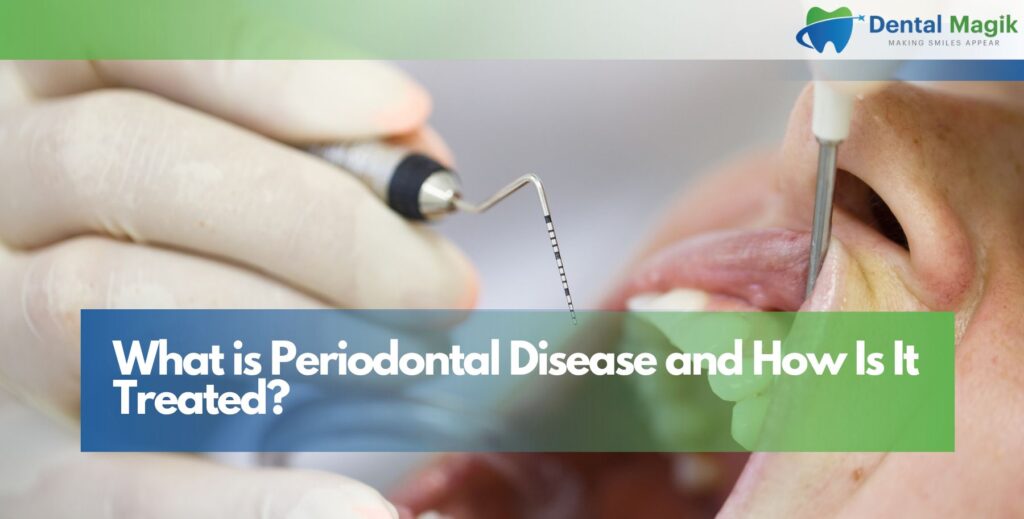Periodontal disease, often called gum disease, is a serious oral health condition that affects the gums, bone, and supporting structures of the teeth. It starts quietly but can progress into a severe issue if not treated early. Unlike cavities, which damage the tooth itself, periodontal disease attacks the tissues that keep your teeth in place.
This disease is more common than many realize. It’s also preventable—and when caught early, it’s manageable and treatable with the right care.
Understanding the Stages of Periodontal Disease
Periodontal disease typically develops in stages. Recognizing the early signs can help avoid long-term damage.
Gingivitis – The Early Stage
This is the first and most reversible stage. It begins with plaque buildup on the teeth, which causes inflammation of the gums. Symptoms include:
- Red or swollen gums
- Bleeding during brushing or flossing
- Mild gum tenderness
With daily brushing, flossing, and professional cleanings, gingivitis can be reversed completely.
Periodontitis – The Advanced Stage
If gingivitis is left untreated, it may turn into periodontitis. This stage involves the destruction of the bone and tissue that support your teeth. Symptoms can include:
- Receding gums
- Loose or shifting teeth
- Persistent bad breath
- Visible gum pockets around teeth
This stage requires more involved treatment to stop the progression and restore oral health.
What Causes Periodontal Disease?
The root cause of periodontal disease is plaque, a sticky film of bacteria that forms on the teeth. When plaque isn’t removed through brushing and flossing, it hardens into tartar, which can only be removed by a dental professional.
Other risk factors include:
- Smoking or tobacco use
- Poor oral hygiene
- Genetics
- Hormonal changes
- Chronic illnesses like diabetes
Some patients in East Brunswick with underlying health conditions may be at higher risk and should have regular dental visits.
Symptoms You Shouldn’t Ignore
Gum disease is often silent in the early stages. That’s why it’s important to know the warning signs. Common symptoms include:
- Bleeding gums
- Chronic bad breath
- Gum recession
- Pain while chewing
- Pus between teeth and gums
If you experience any of these symptoms, it’s best to consult a periodontal specialist or your general dentist.
How Is Periodontal Disease Diagnosed?
During a dental exam, your dentist will:
- Check for gum inflammation
- Measure gum pocket depths
- Examine your bite and tooth alignment
- Take X-rays to assess bone loss
These steps help determine the severity of gum disease and the best course of treatment.
Treatment Options for Periodontal Disease
Treatment options for periodontal disease depend on how advanced it is. Early stages are managed with professional cleanings and improved oral hygiene. More serious cases may need deep cleaning (scaling and root planing), antibiotics, or surgical procedures to restore gum health and prevent tooth loss. Timely care ensures long-term dental stability.
Professional Dental Cleaning
If your gum disease is still in its early stage, a professional cleaning can remove the plaque and tartar causing the irritation.
Scaling and Root Planing
For more advanced cases, this deep cleaning technique is used. It involves removing tartar from above and below the gum line and smoothing the root surfaces to help the gums reattach to the teeth.
Medications
Dentists may also use antibiotic gels or oral antibiotics to reduce bacterial infection in the gums.
Surgical Treatments
In severe cases of periodontitis, surgical options may be necessary, such as:
- Flap surgery – to clean deeper gum pockets
- Bone grafting – to rebuild bone lost to infection
- Tissue regeneration – to encourage growth of new gum or bone tissue
Can Periodontal Disease Be Prevented?
Yes—preventive care is your best defense.
- Brush twice daily with fluoride toothpaste
- Floss every day
- Use an antibacterial mouthwash
- Visit your dentist for checkups and cleanings twice a year
If you’re living in East Brunswick and concerned about your gum health, schedule an exam to ensure you’re not at risk.
Why Early Treatment Matters
Delaying treatment for periodontal disease can lead to tooth loss, bone deterioration, and even increased risk of heart disease. Your oral health is directly linked to your overall health, and treating gum disease early can prevent larger health problems down the road.
Conclusion
Periodontal disease is a serious condition, but it doesn’t have to lead to tooth loss or ongoing pain. With the right care, early intervention, and professional treatment, you can restore the health of your gums and protect your teeth for years to come. If you’re concerned about your gum health, reach out to a trusted Dentist in East Brunswick, NJ for a thorough evaluation and personalized treatment plan.
Frequently Asked Questions (FAQs)
Is periodontal disease curable?
Gingivitis can be completely reversed with good oral hygiene. While periodontitis cannot be fully cured, it can be managed and controlled with treatment and maintenance.
Can I treat gum disease at home?
You can prevent and control early gum disease with brushing, flossing, and rinsing. But advanced stages require professional treatment to stop progression.
Is periodontal treatment painful?
Most non-surgical treatments are done with local anesthesia and cause minimal discomfort. Any soreness after the procedure is usually mild and temporary.
How often should I see the dentist if I have gum disease?
Patients with gum disease are typically advised to visit every 3 to 4 months for cleanings and evaluations to prevent flare-ups.
What happens if gum disease is not treated?
Untreated periodontal disease can lead to tooth loss, bone damage, and even affect your heart and immune system. It’s important to treat it as early as possible.







